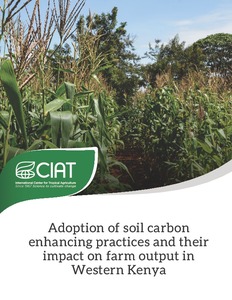Adoption of soil carbon enhancing practices and their impact on farm output in Western Kenya
Adoption of soil carbon practices has the capability of increasing yield, thus improving income and food availability. This paper assessed the adoption of agricultural practices that enhance soil carbon. Data from 334 households were collected in the rural areas of Western Kenya using a multistage sampling technique. The multivariate probit model and propensity score matching method were used to analyze the determinants of adoption of soil carbon practices and the impact on output, respectively. Results show that agroforestry, intercropping, terracing, and the use of inorganic fertilizer are the dominant soil carbon practices, which are discretely and diversely affected by socioeconomic, farm-level, institutional, and biophysical characteristics. However, the adoption of maize-bean intercropping alone has a great impact on maize production and increases output by approximately 240 kilograms. The findings from this study suggest that the adoption capacity of farming households can be accelerated by independently making interventions targeting individual practices rather than compounding the practices. Consequently, emphasis should target interventions that encourage the adoption of intercropping since its economic impact has been evidently underlined.

